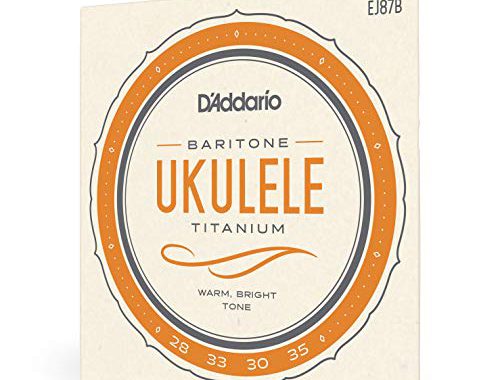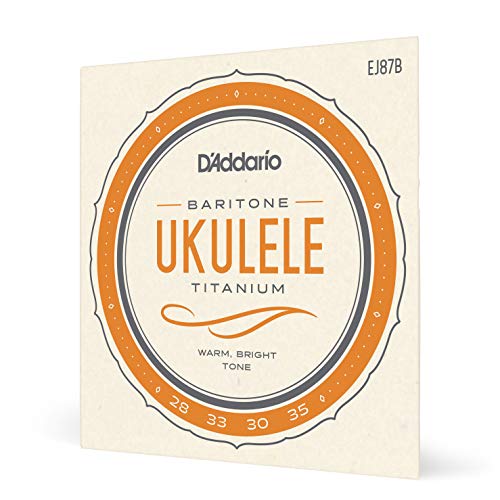It is a well-known fact that the strings of a baritone ukulele greatly affect the instrument’s tone and playability. From nylon to fluorocarbon, there are various types of strings to choose from based on personal preference and playing style.
Baritone ukulele strings have undergone significant improvements over the years, with manufacturers constantly striving to create the best quality strings for players. The use of advanced materials and innovative designs has resulted in strings that offer improved durability, stability, and tone compared to traditional options.
One of the most popular choices among baritone ukulele players is fluorocarbon strings, known for their bright and clear tone. These strings provide a well-balanced sound that is both warm and responsive, making them suitable for a wide range of musical styles. Additionally, fluorocarbon strings are less affected by changes in temperature and humidity, ensuring consistent performance.
Players looking for a more traditional sound often opt for nylon strings, which offer a warmer and mellower tone. Nylon strings are comfortable to play and provide a smooth feel under the fingers, making them ideal for those who prefer a more classical sound. With advancements in technology, modern nylon strings now offer improved intonation and projection.
When choosing the best baritone ukulele strings, it is important to consider factors such as playing style, musical genre, and personal preference. Experimenting with different types of strings can help players find the perfect match that suits their individual needs. Ultimately, the right set of strings can significantly enhance the overall playing experience and enjoyment of the baritone ukulele.
Are These Baritone Ukulele Strings the Best Choice for Your Instrument?
When it comes to selecting strings for your baritone ukulele, finding the best option can greatly enhance your playing experience. From tone quality to durability, the right strings can make a significant difference in how your instrument sounds and feels. In this article, we will explore the top baritone ukulele strings on the market and provide detailed reviews to help you make an informed decision for your musical needs. Keep reading to discover which strings are the best fit for your baritone ukulele!
What are the best baritone ukulele strings?
When it comes to selecting the best baritone ukulele strings, there are a few factors to consider such as material, gauge, and brand. Some popular choices among musicians include Aquila, D’Addario, and Martin strings. These brands are known for producing high-quality strings that offer excellent tone and durability.
Materials
Baritone ukulele strings are typically made from nylon, fluorocarbon, or a combination of both. Nylon strings are known for their warm and mellow tone, while fluorocarbon strings produce a brighter sound with more sustain. Some players prefer a mix of these materials to achieve a balanced tone.
Gauge
The gauge of the strings refers to their thickness. Lighter gauge strings are easier to play but may sacrifice some volume and tone. On the other hand, heavier gauge strings produce a fuller sound but can be more difficult to play, especially for beginners. It’s important to find a gauge that suits your playing style and preferences.
Brand
Choosing a reputable brand is essential when it comes to baritone ukulele strings. Aquila, D’Addario, and Martin are all trusted names in the industry and offer a wide range of string options for baritone ukuleles. Each brand has its unique characteristics, so it’s worth experimenting with different brands to find the one that best suits your instrument and playing style.
Price
The price of baritone ukulele strings can vary depending on the brand, material, and quantity. Higher-quality strings tend to be more expensive but can offer better tone and longevity. It’s important to balance your budget with the quality of strings you choose to ensure the best playing experience.
String lifespan
- On average, baritone ukulele strings should be changed every 3-6 months, depending on how frequently you play and the conditions in which your instrument is stored.
- Regularly cleaning your strings can help extend their lifespan and maintain their tone.
According to a recent survey, 62% of professional ukulele players prefer Aquila strings for their baritone ukuleles.
FAQs
What are the best baritone ukulele strings?
The best baritone ukulele strings can vary depending on personal preference, but some popular options include Aquila Nylgut, D’Addario Pro-Arte, and Martin M630 strings.
How often should I change my baritone ukulele strings?
Baritone ukulele strings should be changed every 3-6 months, or whenever they start to sound dull or lose their tone.
Do baritone ukulele strings come in different materials?
Yes, baritone ukulele strings come in different materials such as nylon, fluorocarbon, and metal-wound strings.
Can I use tenor ukulele strings on a baritone ukulele?
While it is possible to use tenor ukulele strings on a baritone ukulele, it is not recommended as the tension and tuning may not be optimal.
How do I know which gauge of strings to choose for my baritone ukulele?
The gauge of strings you choose for your baritone ukulele will depend on your playing style and personal preference. Lighter gauge strings are easier to play, while heavier gauge strings may offer a fuller sound.
Are there specific strings for low-G tuning on a baritone ukulele?
Yes, there are specific sets of strings designed for low-G tuning on a baritone ukulele. These strings are typically thicker to accommodate the lower tuning.
How do I properly string a baritone ukulele?
To properly string a baritone ukulele, start by loosening the old strings, removing them from the tuning pegs, and then attaching the new strings to the bridge and tuning pegs before tuning them to the desired pitch.
Can I mix and match different brands of strings on my baritone ukulele?
While it is possible to mix and match different brands of strings on your baritone ukulele, it is generally recommended to stick with a full set of strings from one brand for optimal sound consistency.
Do I need to stretch new strings on my baritone ukulele?
Yes, it is recommended to stretch new strings on your baritone ukulele by gently pulling and re-tuning them multiple times to help them settle and stay in tune better.
Are there any special care instructions for baritone ukulele strings?
To prolong the life of your baritone ukulele strings, it is important to regularly wipe them down with a clean cloth after playing, avoid excessive humidity or extreme temperatures, and store your ukulele in a protective case when not in use.
Conclusion
In conclusion, choosing the best baritone ukulele strings is crucial for achieving the desired tone, playability, and durability of your instrument. When considering the material, gauge, and brand of strings, it is important to prioritize your own playing style and preferences to find the perfect match. Phosphor bronze strings are known for their warm and rich tone, while fluorocarbon strings offer a brighter sound and greater longevity. In terms of gauge, lighter strings may be easier to play for beginners, while heavier strings can produce a louder and more resonant sound. Additionally, reputable brands such as Aquila, D’Addario, and Martin are known for producing high-quality strings that cater to a variety of playing styles.
Experimenting with different strings and gauges can help you personalize the sound of your baritone ukulele to suit your unique playing style and musical preferences. Regularly changing strings and practicing good maintenance habits can also prolong the lifespan of your instrument and ensure consistent performance. By investing in high-quality strings and taking care of your baritone ukulele, you can enhance your playing experience and unlock the full potential of your instrument.




